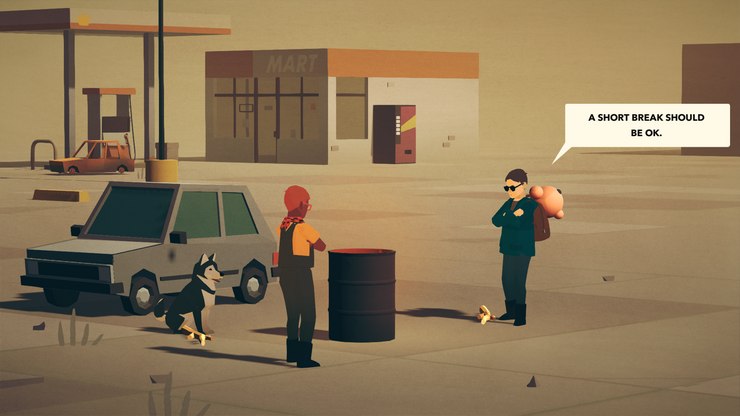In Finji’s Overland, you protect a dog while making your way through a monster-infested, post-apocalyptic America.
You see, your precious floofball is the only good boy and… Huh? What do you mean the dog is optional?
Alright, so you’re taking care of a small group of travelers. Fine, whatever. In any case, the United States are in shambles, and the remaining humans are scattered all over the land and have to make do with whatever they can scavenge. And if that’s not enough, there are some monstrous critters about to snack on you. Better gather those gas tanks, start your car, and get out of there.

Travel is node-based, with each leg of the journey using up precious fuel. So, you will have to make frequent stops, scavenge for fuel and other supplies, switch vehicles in case your group gets too big, or rescue other people who are stranded out there. At the end of each map segment, there’s a particularly challenging level. A burning gas station maybe, or a blocked road you’ll have to cross while monsters erupt from the ground all around you.
Turn-based games like this are usually pretty combat-focused. However, in Overland, there’s no point in making a stand. These are fights you cannot win, so grab what you can and scram. Your people (and dogs) are pretty squishy and go down in two hits, so avoiding combat is wise. If all else fails, you may use some makeshift weapons such as sticks or bottles to defend yourself and even take down the smaller monsters. But you are better off running.

Now, here’s the thing: all characters only have two actions per turn: move and interact. Go to the garbage bin, search for stuff. Hit a monster, retreat. Get in the car, drive away. This makes the game play slowly, deliberately. However, some situations have you at the edge of your seat. Will everyone make it? Will this daring maneuver be your undoing? Can you pet the dog? Of course, things never quite go as planned.
All of this may look simple, but it’s not simplistic. A lot of thought went into every detail here. Over the years, Finji have fine-tuned just about every small thing, from the way stuff works to how it feels. The UI also went through several iterations, and the basics are easy to grasp. It is the details you will have to figure out along the way. Found a lighter? That’s fine, but what can you do with it? (Pro tip: do not try to set your own car on fire. Trust me on this).

Where Overland really shines is through the emergent narrative that unfolds. The game doesn’t give you much in terms of background information. It merely throws you inconsequential little story beats like “this character was a volunteer firefighter” or “her aunt always thought this would happen.” But through their adventures and your decisions, these people grow on you and a story unfolds in your head.
There will be dramatic moments aplenty. Narrow escapes, heroic sacrifices, somber and tired moments of respite at the campfire. Losing someone feels horrible. Getting away with squealing tires in the last second when everything is on fire and monsters are everywhere feels glorious. When you play Overland, you’ll have stories to tell. Not all of them happy ones, mind, but memorable all the same.
Overland is available now on the Nintendo Switch, PS4, Xbox One, itch.io, GOG, and Steam.

